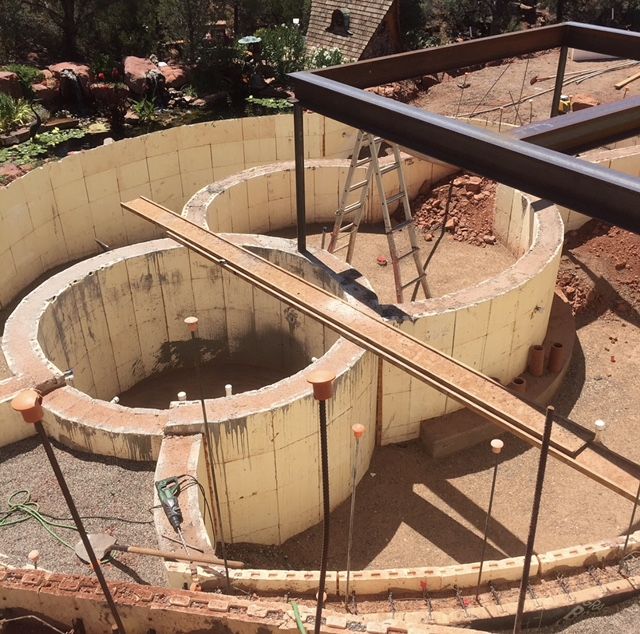
The Best Material Options for a Reliable Pool Foundation

What better way to transform your backyard into a summer oasis than by adding a pool! Hours of fun and relaxation will make your backyard the ideal summer destination. Adding a pool is a big decision though so you’ll want to make sure you do it right. When deciding to invest in a pool, you’ll want to make sure you choose the best option for a reliable pool foundation.

Do Pool Foundations Matter?
The answer is: absolutely! Water is incredibly heavy with a 9,000 gallon pool weighing in at 74,000 pounds of water. With that much weight, a strong sturdy foundation is an absolute must. The last thing you want is your pool shifting, adjusting, or cracking after being installed, and you certainly don’t want to have issues with the foundation’s reliability in the future. Choosing the right materials from the start can save you from a tremendous amount of headaches (and expense) later.

What Are the Options for Pool Foundations?
Once the hole for the pool is dug, it is time to install the foundation. Some of the most popular pool foundations commonly available are:
Fiberglass
Plastic or steel frame with vinyl
Shotcrete or Gunite
Insulated Concrete Forms (ICFs)
Fiberglass pools are built using a fiberglass shell that is produced in a factory and installed in the pre-dug hole with a crane. One of the big limitations to a fiberglass pool is the lack of customization available. You often have to choose from the available shapes and sizes, and the steps and other features are all pre-formed. UV-exposure can also be an issue too after 10 to 15 years.
For a slightly more customizable option, plastic or steel frames can be constructed and lined with heavy duty vinyl. The vinyl-lined structure is then set into the hole on top of a bed of sand. Vinyl also has issues with UV-exposure and can deteriorate in 10 to 18 years even with the addition of UV inhibitors.
Shotcrete and gunite open up the possibilities for much greater customizability. Steel rebar is used to line the hole dug for the pool’s foundation. Any shape can be made, whether circles, hearts, guitars, or just a standard rectangle. After the rebar is in place, the shotcrete or gunite mix is applied on top of the rebar. One of the other benefits of a concrete-based foundation is that the durable concrete is easier to repair in the future, if needed. Proper installation of a shotcrete or gunite foundation requires highly trained technicians though, and can be easily messed up if the installing contractor isn’t careful.
Insulated concrete forms (ICFs) provide many of the benefits of shotcrete/gunite and add in the ease of installation and insulation. ICFs don’t require any heavy machinery for delivery, lifting, or cutting. ICFs prevent the need for precise excavation too. If you over-dig, the walls can be backfilled after they are placed. Without the need for highly trained installers, ICF installation is also more forgiving. ICF pool foundations can take a variety of finishes with both plaster and liners being popular options.

Why Do ICFs Make Great Pool Foundations?
Insulated concrete forms have a great track record of being strong and energy-efficient options for home building. Many of the reasons they excel in building long-lasting homes are what make them an excellent candidate for pool foundations. Let’s look at some of the top reasons you should use insulated concrete forms for your new pool’s foundation:
Energy Savings
The ground is actually a great conductor of heat, much better than the air. Up to 80% of a pool’s heat is lost through the sides and bottom of the pool. Using ICFs will help keep your pool warm longer, meaning you can use it later into the year. If you heat your pool’s water, ICFs will reduce the size of the heater needed and greatly reduce the energy costs associated with heating the pool.
Durability
ICFs are an incredibly durable, long-lasting material. ICF buildings often have life expectancies of 200 years. The low upkeep costs and outstanding resilience make ICFs a wonderful option for a low-maintenance pool foundation.
Convenience
Sometimes the ideal location for your pool is not the ideal location to build it. Whether an awkward shape, on an incline, or in a small backyard, sometimes pool construction is difficult. ICF blocks can be hand carried and set into place, reducing some of the need for heavy equipment and labor.
Curved walls and other aesthetic features can be a nightmare for pool designers. ICFs can make those a reality by easily allowing curves, arches, and other design options. ICFs allow you to truly create the pool of your dreams.

Choose Fox Blocks for Your Pool’s Foundation
When deciding on the foundation for your new pool, choose ICFs to get a long lasting, easy to install, and energy-efficient pool foundation. Still have questions about which pool foundation is right for you? The friendly team at Fox Blocks is here to help. Reach out today to learn more about why Fox Blocks should be the foundation of your backyard oasis.